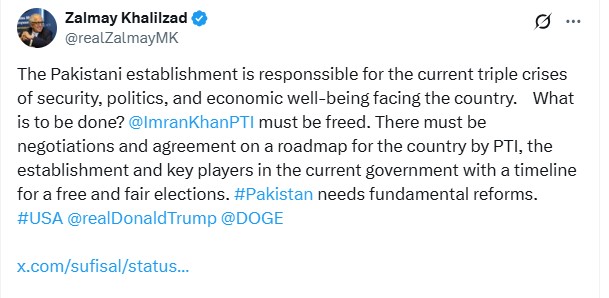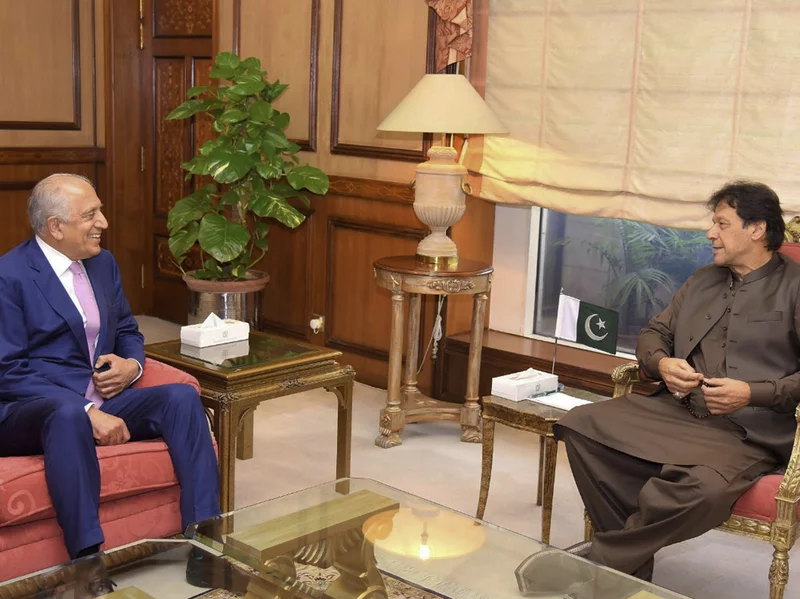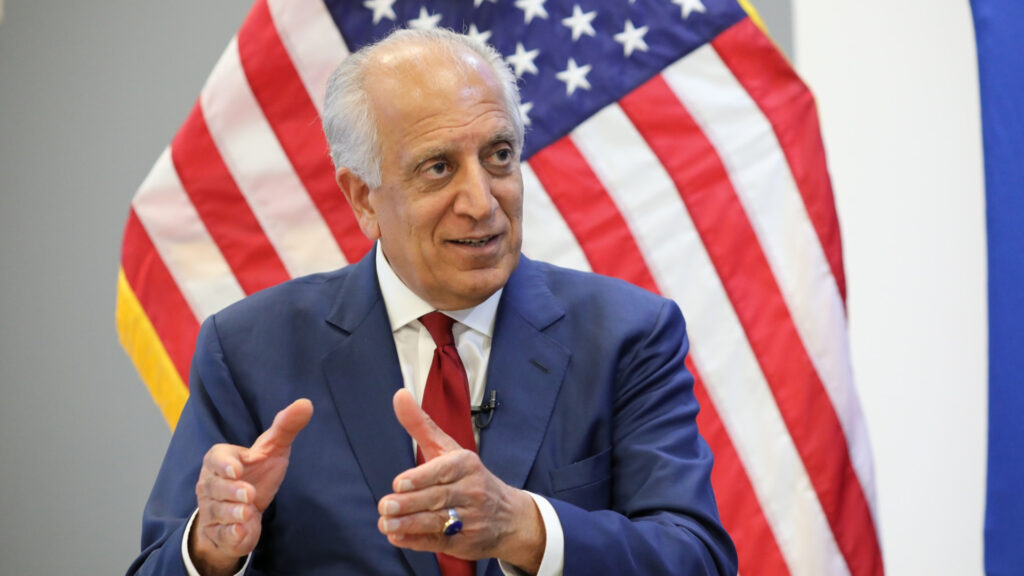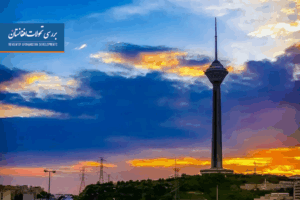Review of Afghanistan developments
Zalmay Khalilzad, an experienced Afghan-American diplomat and the former US representative to Afghanistan, has been actively sharing messages on X Network advocating for the release of Imran Khan, the former Prime Minister of Pakistan, who is presently incarcerated and this topic that turned to a process. In his recent message on the topic, he asserted that Imran Khan should be set free and called for negotiations and a mutual agreement among the Tehreek-e-Insaf Party, which Imran Khan led, the government, and key stakeholders in the current government to devise a roadmap with a timeline for the organization of free and fair elections.
At first sight, Khalilzad’s position could be interpreted as a supportive move for democracy and its principles. However, one must question why he has chosen to concentrate on Pakistan, particularly regarding the release of Imran Khan, among all nations globally. This article intends to provide insights into this matter.
Khalilzad’s roadmap
Since the Bonn Conference in 2001, which established the Afghan republic, Zalmay Khalilzad has had a significant influence on US policy in Afghanistan, both directly and indirectly. His involvement has continued through the republic’s collapse and into the present US administration, even though he does not hold an official position. Khalilzad is well-versed in the political intricacies of this area.
Throughout the two decades of the US conflict in Afghanistan, Khalilzad became aware of Pakistan’s dualistic role. On one side, Pakistan functioned as a strategic ally of the United States, while on the other, its support for the Taliban significantly contributed to the empowerment of America’s foes and the Afghan government it endorsed. The core of this strategy was rooted in the actions of Pakistan’s military and the ISI. Consequently, Khalilzad attributes the underlying issues to these two institutions within Pakistan.
His feelings of resentment and animosity towards these two Pakistani institutions are apparent in his numerous messages, including the latest one, which depicts Pakistan as teetering on the edge of economic and political collapse, with an implicit accusation directed at the military for this predicament.
By examining Khalilzad’s statements in the context of Pakistan’s security landscape, one can deduce that his plan includes advocating for the release of Imran Khan from prison. As a prominent critic of the current government, Imran Khan has the potential to act as a significant force in shifting power from the military to the political leadership in Pakistan. Khalilzad’s approach also aligns with certain internal demands within the country.
Imran Khan’s role in Khalilzad’s roadmap
Imran Khan, the ex-prime minister of Pakistan and head of the popular Pakistan Tehreek-e-Insaf party, plays a crucial role in Khalilzad’s proposed roadmap. Imran Khan is a vocal opponent of the military and maintains a perspective on Afghanistan that contrasts sharply with that of the generals in the Pakistani army. While serving as prime minister, he advocated for the withdrawal of U.S. forces from Afghanistan and supported negotiations with the Taliban government.
Khalilzad finds additional appealing traits in Imran Khan’s personality. Khan’s Pashtun background and his optimistic outlook on the Afghan Taliban might enable him to contribute positively to the resolution of the strained relations between Afghanistan and Pakistan. Given Khalilzad’s expertise in the region’s ethnic dynamics, He may have a distinct interest in this facet of Imran Khan’s personality and count on it.
Weakening the Pakistani army
From the establishment of Pakistan, the military has been a central figure in the formulation of the nation’s domestic and foreign policies, exerting significant influence over the power landscape through multiple coups and discreet interventions that have resulted in the collapse of governments, notably the removal of Imran Khan through a parliamentary no-confidence vote. The evident hostility Khalilzad exhibits towards the Pakistani military, along with his overt support for the release of Imran Khan, as demonstrated in his numerous Twitter communications, suggests his approach to confronting the role and standing of the Pakistani military.

Among the political parties in Pakistan, Imran Khan’s stance is most closely aligned with Khalilzad regarding the transformation of institutional roles, specifically in terms of reining in the military and bolstering civilian governance. While other parties, such as the Nawaz Party and the People’s Party, share similar aspirations, none have demonstrated the same level of resolve as Imran Khan. It is important to highlight that Khan’s Pakistan Tehreek-e-Insaf party enjoys significant support, particularly among the youth of Pakistan, who are also advocating for change. This party poses a substantial challenge to the military’s authority.
In Khalilzad’s perspective, should Imran Khan be freed and regain his position of authority, it is anticipated that there will be shifts in the power dynamics of Pakistan, potentially leading to a diminished influence of the military in the country’s foreign policy.
Imran Khan’s ethnicity: a factor in his ties with the Taliban government
As previously noted, Imran Khan’s Pashtun heritage significantly influences Khalilzad’s strategic framework. The Taliban government in Afghanistan may have a better sense and opportunity to interact with someone of its own ethnicity at the head of the Pakistani government. This is particularly relevant given that Imran Khan has been one of the proponents who recognized the Taliban as a legitimate political force in Afghanistan and advocated for collaboration and engagement with their government.
Khalilzad, an advocate for the Taliban administration, views Imran Khan’s ascension to power as a potential avenue for fostering peace between Pakistan and Afghanistan, aiming to address the escalating fundamental issues and challenges between the two countries. He expresses apprehension that the ongoing tensions between Kabul and Islamabad may ultimately drive Pakistan to consider the option of toppling the Afghan government that opposes its interests, reminiscent of actions taken fifty years ago.

Challenges and risks ahead for Khalilzad’s roadmap
Although Khalilzad holds a significant position within the US administration and has garnered some support for his plan in Pakistan, the Pakistani military has entrenched its authority in a manner that makes altering its role and status a challenging endeavor. Furthermore, any potential release of Imran Khan is likely to encounter substantial opposition from the institutions responsible for his incarceration. Competing political factions, including the Nawaz Party and the People’s Party, which wield considerable influence within the power dynamics, are unlikely to back Imran Khan’s release. Even in the event of his release, a return to power for Imran Khan seems highly improbable.
Additionally, undermining Pakistan’s military framework may have unintended consequences, potentially leading the nuclear-capable nation into turmoil. A deterioration or collapse of the military could result in a catastrophic outcome for Pakistan, which, contrary to Khalilzad’s intentions, would also have repercussions for Afghanistan.
Speculation about Khalilzad’s roadmap
The backing of this plan by Trump and the US State Department is contingent upon several factors, such as the state of India-US relations, Pakistan’s adherence to US strategies, and the nature of the Taliban government’s engagement with the United States.
Should the Pakistani military establish a dialogue with the US government, it is improbable that there will be any alteration in the power dynamics within Pakistan. At present, the Pakistani military is making significant efforts to advocate for US backing and aims to be selected as Washington’s regional ally.
Should the Trump administration acknowledge the detrimental impact of the Pakistani army on its policies, it might choose to exert pressure on Pakistan and prioritize Khalilzad’s roadmap.
Conclusion
Khalilzad’s calls for the release of Imran Khan extend beyond mere humanitarian or democratic concerns. His communications on X-Network appear to be a strategic effort aimed at destabilizing Pakistan’s military-dominated power framework and facilitating Imran Khan’s return to leadership. Khalilzad asserts that if Imran Khan assumes power, leveraging his Pashtun identity and perspectives on the Taliban regime, it will transform the dynamics between Kabul and Islamabad, ultimately reinforcing the Taliban government.
The effectiveness of the Khalilzad’s roadmap is contingent upon a range of complex factors. Nevertheless, the Trump administration might prioritize the Khalilzad’s roadmap once it establishes its regional strategy, provided that the Pakistani military does not support it.

















